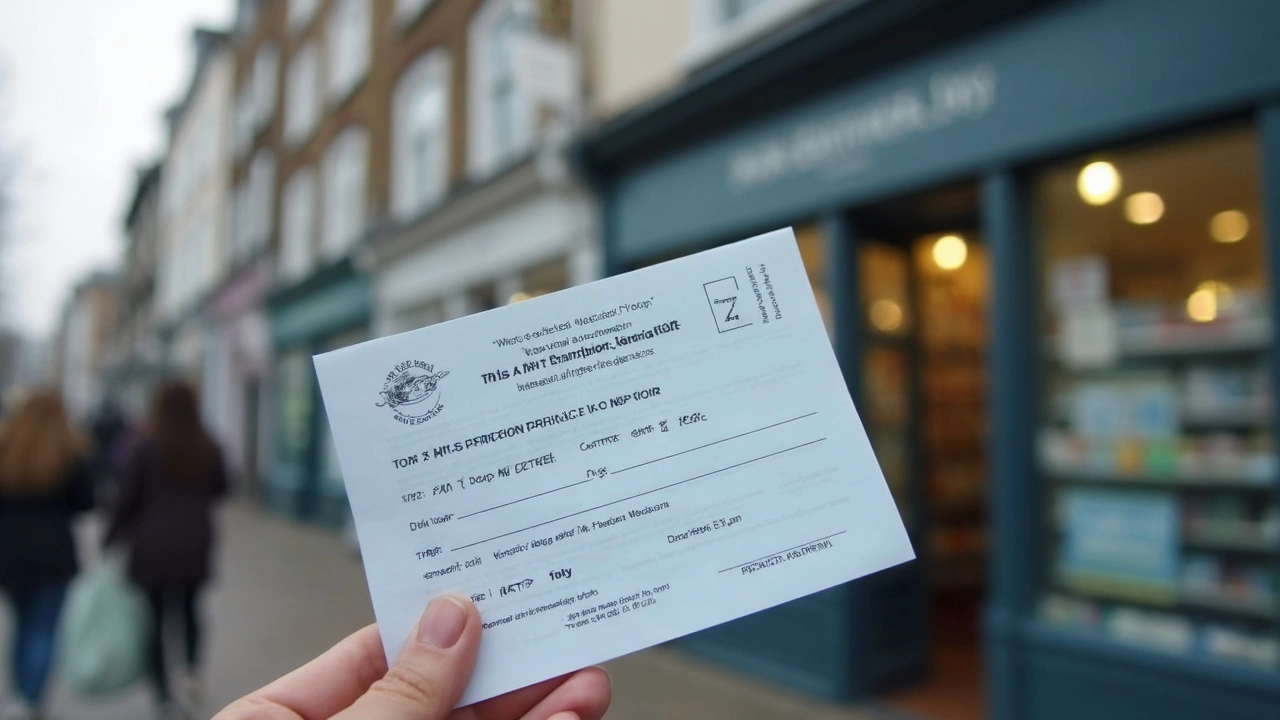 Jun, 18 2025
Jun, 18 2025
Paying for prescriptions can get expensive, especially if you need medication every month. The good news? If you have certain health conditions, you might not have to pay a penny for your prescriptions in the UK.
Knowing if you qualify is the first step. Some conditions are automatically covered, but it's not always obvious who gets what, or even how to claim the exemption. Even just one missed form can mean shelling out on medication you could've had for free.
So here's the deal—I'll break down who gets free prescriptions, the exact medical conditions that qualify, and how you can apply if you tick the right boxes. No jargon. Just the stuff you actually need to know to save money and get the medications sorted.
- Who Can Get Free Prescriptions?
- Medical Conditions That Qualify
- How to Apply for a Medical Exemption Certificate
- Tips for Managing Prescription Costs
Who Can Get Free Prescriptions?
If you live in England, getting free prescriptions usually depends on your age, income, and health conditions. When you visit Scotland, Wales, or Northern Ireland, all prescriptions are free for everyone, but in England, you have to meet specific rules. It’s easy to get lost in the details, so here’s what actually matters.
You’re likely eligible if:
- You’re under 16, or 16-18 and in full-time education
- You’re aged 60 or over
- You have a qualifying medical condition (more details on these soon)
- You’re pregnant or had a baby in the last year
- You get certain low-income benefits, like Universal Credit (with earnings limits), Income Support, or Pension Credit Guarantee
- You have a valid NHS Medical Exemption Certificate (see how to get this in an upcoming section)
- You have an NHS Tax Credit Exemption Certificate or an HC2 certificate for full help with health costs
Plenty of people fit into one of these groups but don’t realise they could be saving money. And while paying per prescription might not feel like a big deal, it can quickly add up—especially if you’re dealing with a long-term condition or chronic illness.
Check out this quick table to see the most common reasons people get their prescriptions for free in England:
| Reason for Free Prescription | Who Qualifies? |
|---|---|
| Age under 16 or 16-18 in education | Children and full-time teens |
| Age 60+ | All over-60s |
| Medical condition | With NHS exemption certificate |
| Pregnant/recent mum | With valid maternity exemption |
| Low income/benefits | On qualifying benefits or with HC2 |
So, if you fall into one of these groups or think you might, it’s really worth checking your eligibility. If you’re not covered, there are other ways to save, like NHS prescription prepayment certificates, but more on that later.
Medical Conditions That Qualify
If you have certain long-term health problems, you can get free prescriptions on the NHS. There's actually a fixed list—so it's not up to your doctor's personal opinion. Most people who qualify have what's officially called a “Medical Exemption Certificate.” Without it, you’ll still be charged, even if your condition is covered.
Here’s which medical conditions make you eligible in England as of 2025:
- Diabetes (except for diet-controlled type 2)
- Epilepsy needing ongoing medication
- Hypothyroidism needing hormone replacement (like levothyroxine)
- Hypoparathyroidism
- Addison’s Disease or other adrenal insufficiencies for which steroid replacement is needed
- Certain ongoing physical disabilities (if you can’t go out alone)
- Pituitary gland disorders—for example, hypopituitarism needing hormone replacement
- Cystic fibrosis
- Form of cancer (including those who have had cancer in the past but still need treatment for it)
- Sickle cell disease
- Permanent fistula, such as a colostomy or ileostomy, needing continuous draining
Not every chronic condition counts. Common problems like asthma or high blood pressure don’t qualify unless you also have one of the specific conditions in the list.
Check this quick overview to see which conditions are covered and how much of a difference it makes. The NHS reports that about 90% of prescriptions dispensed in England are free, and medical exemptions make up a chunk of that.
| Condition | Does it Qualify? | Notes |
|---|---|---|
| Type 1 Diabetes | Yes | All forms covered |
| Type 2 Diabetes (tablet/insulin-controlled) | Yes | Covered if medication needed |
| Diabetes (diet only) | No | Not covered |
| Asthma | No | Unless also has a listed qualifying condition |
| Epilepsy | Yes | Only if you need continuous medication |
| Cancer (current or post-treatment) | Yes | Includes related medications |
| Underactive Thyroid | Yes | Continuous hormone therapy needed |
So, if you’re wondering if your condition is on the NHS list, check with your GP or pharmacist. And if you qualify for free prescriptions, make sure you apply for your exemption card—otherwise, you might end up paying out of pocket when you don't need to.

How to Apply for a Medical Exemption Certificate
If you've got one of the qualifying conditions, getting a medical exemption certificate (often called a 'MedEx') is a game-changer. It’s like your golden ticket for free prescriptions across England. The application process isn’t tricky, but you need to do it right so you don’t miss out.
Here’s how you sort it out:
- Get the MedEx application form (FP92). You can’t get this online—you have to pick it up from your GP’s surgery.
- Your GP or a member of their team will fill in the part about your medical condition.
- You fill in your details and sign the form. Quick tip: double-check everything before you hand it back.
- Your GP will send the completed form off to the NHS Business Services Authority for you, so don’t post it yourself.
- If you’re approved, your MedEx certificate gets posted to your home. Keep it safe—you’ll need to show your pharmacy. While you’re waiting for the certificate, you still have to pay for prescriptions unless you’ve got proof of entitlement, so keep the timelines in mind.
The certificate lasts 5 years, but it’s smart to note the expiry date on your calendar. When it’s running out, you need to reapply if you still qualify.
Now, here’s a quick snapshot of what you’ll need to remember:
| What you need | Where to get it | How long it lasts |
|---|---|---|
| FP92 MedEx form | GP surgery | 5 years |
| GP confirmation of qualifying medical condition | GP completes it | --- |
| Final certificate | Arrives by post after approval | 5 years |
Don’t forget: if you move or change your name, let the NHS know or you could miss renewal reminders. That’s how you keep getting those free prescriptions without any headaches.
Tips for Managing Prescription Costs
Not everyone gets free prescriptions. If you don’t, there are ways to avoid blowing your budget at the pharmacy. Here’s how people in the UK routinely save cash on medication without skipping what they need.
Free prescriptions aren’t just about medical exemption—there are other schemes out there if you know where to look. For example, the NHS Prescription Prepayment Certificate (PPC) is basically a season ticket for prescriptions. If you need two or more items every month, you’ll likely spend less with a PPC than paying per item. A PPC for three months costs £32.05, and an annual one is £114.50 (as of 2024). Check out how much you’d spend each month and see if a PPC makes sense for you.
- Ask your GP about generic medication. Generic drugs are the same as branded ones but cheaper.
- Watch for NHS free prescription age limits—once you’re 60 or older in England, all meds are free.
- Income-based exemptions exist too, like for people on certain benefits. Use the NHS eligibility checker online to see if you qualify.
- Students with low income, pregnant women, or parents with young kids can sometimes get help, so talk to your pharmacy or clinic.
Surprisingly, prescription costs can change across the UK. While people in Scotland, Wales, and Northern Ireland pay nothing for NHS prescriptions, people in England have to pay unless they qualify for an exemption or use a PPC. Check the details in this simple table:
| Country | NHS Prescription Cost (2024) |
|---|---|
| England | £9.90 per item |
| Scotland | Free |
| Wales | Free |
| Northern Ireland | Free |
If you’re really struggling to pay, talk to your pharmacist. They’re used to helping people find ways to save, or they might point you to local schemes or charities that cover prescription costs in emergencies.
Keeping track of repeat prescriptions can also cut down on wasted medication (and save money). Lots of GP surgeries and pharmacies are on apps now so you can order just what you need, when you need it. Sophia reminds me every month to check in on our pet meds and our own, so nothing piles up or goes out of date.
